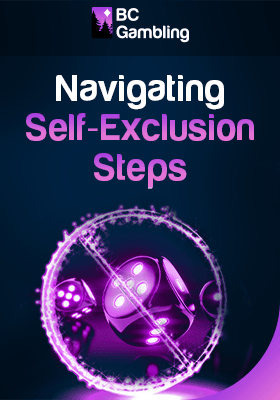BC's Self-Exclusion List: Your Guide to Responsible Online Casino Gambling
The self exclusion process signifies more than a personal choice; it reflects a commitment to responsible gambling. By voluntarily opting to be part of this program, individuals can gain control over their casino gaming habits, benefiting themselves and the wider community. However, like any system, it comes with its challenges and nuances. This guide aims to educate readers about Self Exclusion in BC.
Understanding Self-Exclusion in BC
The concept of Self Exclusion in BC is gaining attention as an essential tool to address gambling-related issues. It serves as a preventive measure and a solution for those facing these type of problems.
Casino Gambling is a prominent activity in British Columbia. As per data collected in 2014:
- 73% of adults reported past-year gambling at casinos.
- Around 3% face difficulties limiting playing at casinos, turning it from a pastime into a potential problem.
- Approximately 125,000 British Columbians could benefit from enrolling in the Voluntary Self Exclusion (VSE) program.
- Approximately 6,700 individuals are enrolled in the VSE program every month, about 5% of the moderately to high at-risk population.
-

What is Self Exclusion?
Self-exclusion is a voluntary program where individuals can avoid entering legalized gambling premises, including casinos, racetracks, and off-track betting establishments. This program does not apply to illegal or unregistered forms of betting. It offers several ways to help gamblers in British Columbia, Canada, such as:
- Exclusion from British Columbian casinos, bingo halls, and online casino sites for six months to three years.
- Opportunities to connect with free problem casino addiction counselling.
- Ensuring the gambler's name is removed from casino mailing lists and their Encore Rewards Card is revoked.
-

Significance of Self Exclusion
Preventing gambling addiction is a critical concern affecting society. Every year, thousands are treated for this addiction, and self exclusion is a preventive measure for many others at risk. Governments, recognizing the importance of tackling this issue, cooperate with casinos and other gaming establishments to take safety measures to combat addiction, with self exclusion as a vital program.
Despite the associated social stigma, self exclusion often becomes a last resort for those seeking rescue from gambling addiction. The practice of self exclusion is not isolated to one region; for example, in British Columbia, the initiative is part of a broader framework aimed at fostering responsible gaming and providing support for those in need.
The Connection Between Self Exclusion and Gambling Addiction
The potential benefits of self-exclusion extend beyond limiting access to casinos. By participating in self-exclusion programs, individuals can experience reduced betting expenditure, improving overall financial circumstances. Moreover, self exclusion often decreases gambling frequency and the time spent on casino activities. It can also significantly reduce the severity of problem betting and related psychological difficulties, such as depression and anxiety. Ultimately, self-exclusion empowers individuals with enhanced control over their circumstances, giving them the tools to regain balance and make positive life changes.
Self-Excluded People That Identify as Problem Gamblers: Research in BC
According to research:
- 74% of the sample had the highest risk of being a problem gambler.
- 15% scored in the moderate-risk range.
- 90% of the sample were either moderate-risk or problem gamblers when they began their latest or first enrollment with the VSE program.
Statistics and Data on the Impact of Self-Exclusion
The impact of self-exclusion on casino betting behaviors has been a subject of substantial research in Canada. Various studies have shed light on different aspects of this issue, ranging from the effectiveness of self-exclusion in curtailing casino activities to the relapse rates among self-excluded individuals.
-

Utilization of Self-Exclusion Programs
Based on data from 2005 across seven Canadian provinces, between 0.6 and 7.0% of problem gamblers in casinos opted for self-exclusion (Williams et al., 2007). These low utilization rates signify the need for enhanced promotion and potential modification of these programs.
-

Behavioral Impact
Focus groups conducted by the Responsible Gambling Council in 2008 revealed that self-exclusion reduced the number of casino player sessions and the time and money spent on gambling. However, it must be noted that this sample may not be representative of all self-excluders.
Effectiveness of Preventing Return to Gambling
- Success in Abstaining: Despite 33% of participants breaching self-exclusion agreements, most self-excluded participants reported significant assistance in stopping or reducing casino gambling activities.
- Other Forms of Gambling: Interestingly, 59% of casino players reported engaging in other types of gambling not covered by their self-exclusion agreements, showing a potential loophole in the system (Responsible Gambling Council, 2008).
Relapse Rates in BC
- Attempt to Re-enter Casinos: In British Columbia, 15% of respondents indicated that they had tried to re-enter a casino during exclusion. This marked a decrease from a previous study where 23% had attempted to violate their agreement within six months.
- Chronic Violators: Within the violating subgroup, the number of attempts varied, with some trying over 100 times, but most (29%) attempting only one to three times.
- Multiple Violations: Among those who violated their agreements, it was common for them to do so multiple times. A total of 25% reported violating their agreement once, while 35% reported two to five violations.
The Process of Self-Exclusion in BC
Self-Exclusion in BC is an essential process that allows individuals with casino gambling problems to take control of their behavior. By voluntarily excluding oneself from casinos and online platforms, individuals can find a structured support system to help curb their addiction. This mechanism is built on different pillars, such as joining the self-exclusion list, understanding the duration and renewal process, and abiding by the terms to avoid consequences.
How to Join the Self-Exclusion List
In British Columbia, Canada, individuals can self-exclude from gambling casinos and platforms through various means. This self-exclusion acts as a valuable tool for those struggling with addiction.
- In-Person at any Gambling Facility: Individuals can visit any casino, community gaming centre, or commercial bingo hall with a government-issued photo ID. A GameSense Advisor or staff member will guide them through the enrollment process, including photograph-taking.
- Virtual Enrolment: The process can be completed virtually by arranging a video call with a GameSense Advisor and having a government-issued photo ID ready.
- Online Self-Enrolment: Logging into a PlayNow casino account allows individuals to follow on-screen instructions to complete self-enrollment. This method only excludes them from playing on specific platforms like PlayNow.com and the BCLC Lotto! App.
- Data Points: From April 2009 to March 2010, 3905 patrons registered for Voluntary Self-Exclusion (VSE) in British Columbia. There has been a continuous increase in casino enrollments from 2006 through 2009.
Duration and Renewal of Self-Exclusion
The self-exclusion process in BC is not a one-size-fits-all solution; it offers flexibility in the duration and potential renewal of the exclusion period.
- Duration: The length of self-exclusion can be selected for six months, one year, two years, or three years. Once set, this duration cannot be altered.
- Renewal Process: Individuals may contact BCLC's Customer Support Centre for a new 'temporary' agreement renewal if an extension is required.
- Data Points: Most re-enrollments were for six months (55%) or one year (40%). Many casino participants re-enrolled as soon as they felt they needed it. The renewal experience was perceived the same or better by 98% of the participants who re-enrolled, with many citing a faster process and knowing what to expect.
Consequences of Violating Self-Exclusion Terms
Violating the terms of self-exclusion can lead to serious consequences, and understanding these is critical for compliance.
- Penalties: If a self-excluded individual is found playing in casinos or other platforms, any winnings or losses are confiscated, and the money is sent to the Department of Alcohol and Drug Programs. Repeat violations may lead to notifications being sent to all local casinos.
- Role of Casino Operators: The enforcement of self-exclusion relies heavily on casino operators' ability to detect and report violations. However, detecting self-excluded patrons can be problematic, and systematic procedures often must be improved.
Effectiveness and Challenges
In the modern era, where BC gambling can be accessed in physical casinos and online, the approach to preventing addiction must become multifaceted. The AGLC Self Exclusion program is one initiative to assist Canadians struggling with gambling addiction. By allowing individuals to voluntarily exclude themselves from participating in casino activities, the program seeks to help those who recognize a problem. However, the effectiveness of these programs is influenced by a range of factors, including individual compliance, technological limitations, and the scope of the exclusion itself. The following sections will discuss the success stories and challenges associated with self-exclusion initiatives, shedding light on areas for potential improvement.
Success Stories: How Self-Exclusion Helped Individuals
Real-life success stories of individuals who benefited from self-exclusion can be motivating and enlightening. Here are some of the ways people have used self-exclusion to transform their lives:
Linda's Story
After learning about her husband Richard's casino betting problem, Linda reacted with anger and guilt but moved towards practical solutions. With careful planning and adherence to a self-imposed budget, Linda was able to rebuild their financial security. She also emphasizes the importance of seeking help, using the available resources, and not letting guilt dominate the healing process.
Oliver's Story
Starting as a casual casino gambler, Oliver soon found himself engrossed in a dangerous addiction that consumed his life and finances. Realizing the severity of the problem, Oliver sought to stop. His journey was difficult, but Oliver's decision to self-exclude from casinos helped him regain control and rebuild the relationships and self-identity that gambling had eroded.
Key Takeaways From Linda and Oliver's Stories
Recognizing and confronting gambling addiction demands a profound level of personal courage. For many, the decision to address this issue begins with self-exclusion, a vital starting point that marks a sincere commitment to recovery. However, self-exclusion from casinos on its own may not be enough, and the effectiveness of this measure often relies on broader support and resources.
It's essential to supplement self-exclusion with professional guidance, therapy, and community support to make it truly effective in combatting addiction. The inspiring tales of Oliver and Linda stand as symbols of hope, demonstrating that recovery is possible with the right approach and backing. Their journeys offer encouragement to those Canadians battling similar problems and serve as a heartfelt reminder that the path to recovery, although challenging, is within reach.
Limitations and Challenges of the Self-Exclusion Program
While self-exclusion programs have proven beneficial to some, some notable limitations and challenges need to be addressed:
Potential Barriers and Challenges in Self-Exclusion
Implementing self-exclusion programs is fraught with potential barriers and challenges that may hinder their success. One major barrier is the rise of online casinos, especially in regions where it's not regulated by law. This unregulated casino market can easily get around traditional self-exclusion initiatives, and with the anonymity associated with online play, enforcing self-exclusion becomes an arduous task. Additionally, the social stigma attached to voluntarily admitting an addiction may deter many from opting for self-exclusion in the first place.
The problems extend to consistency in enforcement, where varying laws across jurisdictions lead to uneven application of the laws. Despite exclusion agreements, many gamblers find loopholes and continue playing at casinos, undermining the program's intent. Furthermore, the limited scope of some self-exclusion agreements may only apply to specific casino venues or forms of gambling, leaving ample opportunity for the individual to gamble in other ways.
Evidence from Statistical Data
Sobering statistics support these challenges. For example, a study by Nelson et al. found that only 13% of casino gamblers under a lifetime exclusion agreement did not gamble at all since enrollment. Such challenges underline the complexity of implementing a successful self-exclusion program and emphasize the urgent need for more comprehensive, multi-faceted solutions.
Improving the Self-Exclusion System for Better Outcomes
A multifaceted approach is essential to enhance the effectiveness of self-exclusion in BC and elsewhere. Some recommendations include:
Streamlining the Process
Making self-exclusion more accessible and user-friendly is a crucial step toward a more efficient solution. This includes introducing self-exclusion agreements that cover multiple casino venues and forms, including online casino platforms, to ensure a comprehensive approach.
-

Strengthening Collaboration
Enhanced coordination between casino operators and regulatory bodies is vital. This collaboration can lead to the implementation of consistent enforcement measures across jurisdictions, creating a unified effort to combat problem gambling.
-

Learning from Success Stories
Various countries provide insightful examples of successful implementations. Massachusetts, Norway, Sweden, Germany, and Italy have all taken effective measures, such as mandatory ID checks for both land-based and online casinos, which have led to significant progress in this area.
-

Technological Innovations
Utilizing technology to enforce online self-exclusion is a promising avenue for future development. Solutions could include credit line limitations to prevent gambling beyond one's means and connecting technological tools with the overarching goal of responsible gaming.
-

Holistic Approach
Recognizing that self-exclusion is only part of the solution is vital. A broader strategy, including education, counselling, and community resources, must support it. This holistic approach considers self-exclusion and the comprehensive well-being of individuals affected by a casino gambling addiction.
The self-exclusion program's intent is noble and has proven successful for many individuals. However, persistent effort, innovation, collaboration, and a comprehensive understanding of the challenges at hand are necessary to ensure its continued effectiveness, especially in the digital age. By adopting these recommendations, the AGLC Self Exclusion system and similar initiatives can evolve to meet the needs of those Canadian players seeking help with gambling addiction.
Conclusion
In this thorough exploration of responsible gaming in British Columbia, we have discussed various facets of the self-exclusion initiative. By shedding light on the complex nature of gambling addiction and the efforts made to restrain it, this guide offers a comprehensive view of current practices, challenges, and opportunities within the region.
This guide emphasizes the importance of a holistic approach to responsible gaming, acknowledging that self-exclusion is but one tool in a broader strategy to protect and support individuals and families affected by gambling addiction. The ongoing efforts in British Columbia, Canada signify a dedicated commitment to fostering a safer and more responsible gaming environment. By understanding, accepting, and practicing these measures without judgment or shame, we can continue to build on this positive momentum and make lasting changes within our communities.
FAQ
- What are the benefits of joining the Self-Exclusion List? Joining the Self-Exclusion List helps individuals control or stop their gambling behavior, thereby reducing related financial and psychological difficulties.
- Can someone reverse their decision after self-excluding? Generally, reversing a self-exclusion decision is not permitted during the agreed-upon period, as the intent is to support individuals in abstaining from gambling.
- How do BC casino operators verify self-excluded individuals? Gaming operators in BC typically verify self-excluded individuals through ID checks, databases, and coordination with regulatory law bodies.
- Is there any financial assistance available for problem gamblers? Yes, some regions and programs provide financial counseling and assistance to problem gamblers to help them manage or recover from financial difficulties.
- What happens if someone tries to enter a casino while on the Self-Exclusion List? If someone attempts to enter a casino while on the Self-Exclusion List, they will be denied entry, and further actions may be taken in accordance with the policies of the jurisdiction or casino.


